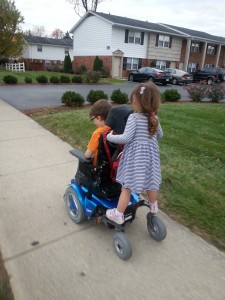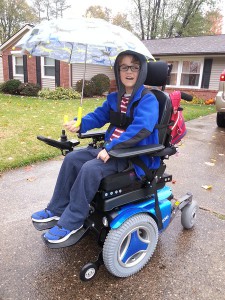Liam received his new power wheelchair a couple weeks ago. He was so excited to get his new chair, and go as fast as possible. He told me he wanted to feel the wind in his hair and he wanted to be faster than his friends.
When we put in the order with his team of doctors for him to get a power chair it came with a little resistance by his therapists. They asked if he was in pain, or if he was having a hard time. I could see that they needed to hear certain words and phrases in order to rationalize this purchase. Yes. He feels pain. Yes. He is having a hard time. My theory on how to deal with this disease, and my parenting style in general, is to try to be one step ahead of things. We aren’t sure what Liam’s future looks like. We could be doing him a disservice by giving him this chair too early. I don’t think that’s the case here.
He has a chair now, at the gentle age of seven. His friends think it’s cool. It’s shiny, fast and has tons of buttons. Liam is a celebrity at his elementary school, everyone who sees him smiles and says hi. It’s beautiful. Because of our decision to get him a chair now he will never have that life changing shock of having to transition to the chair. It’s a cool toy (tool) and it doesn’t have a stigma. His friends know that he uses it, and they will not remember a time without it. Some of his closets friends have learned how to help Liam to stand up when he is having a hard time. They take turns going with him on the lift at the staircase, and it is a sought after position!
No two humans with muscular dystrophy have the same experience. We don’t know what to expect in his life span. In some ways I know more about what this disease means than his doctors do. All I know is that I’m following the advice of his doctors and not pushing his body too hard. This chair gives him a break, and he doesn’t waste his energy on walking, so that he can play. I need him to play.
I am not confident on how to handle every situation, but I feel like I’m doing what I can. I let him ride on my back to get to the public toilet at the park so that he can save his energy for when he returns and wants to be the scary monster and catch his prey. I ask him how I can help, and remind him to take a minute to let his body tell him what it needs.
The initial shock of the disease is over, but I’m bracing for the next wave of grief, change and pain. Until then, I need him to play.

